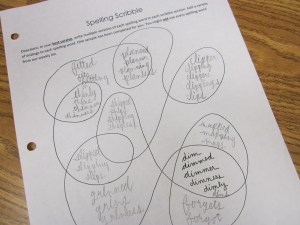Because I always have parents ask me for study suggestions, I am sharing a list of different ideas to help students prep for a test at home. Students who are just beginning to take tests that involve more than memorized facts need a study buddy (that’s you, parent) to monitor and prod. As much as students would like it to be so, staring at a textbook and notes for 45 minutes without actively doing something with the information on the page does not count as studying.
Around 4th grade, tests are more involved; the thinking to complete the test is more involved, so the prep ahead of time has to be more involved. Learning how to study effectively is a skill that has to be supervised and practiced just like learning a new math skill, mastering a new science concept, or grasping themes in literature.
Locate a Good Study Area
- Quiet places are preferable, but they should be in proximity of an adult, babysitter, or person who can monitor occasionally. If you have been telling your child “to go study” and sending him off to his room for extended periods of time, I guarantee very little is happening. TV, music, and other electronics should definitely be off and out of view.
Start with Memorizing Definitions
- If an upcoming assessment has multiple vocabulary words that are critical to the key concepts on the test, begin by learning the definitions. There is a memorization component here, so make old fashioned flashcards or use online resources like SpellingCity.com or Memrise.com to create word banks to practice definitions. Once students know basic definitions, they can use the words to explain important concepts. A student might learn a variety of words related to electricity before studying how charges, atoms, and circuits work.
Set Small, Specific Tasks
- Telling a student to study without a specific task will not produce results. Know what the student needs to study and give a small, doable task with a time limit. For example, if a student has a test over the Mayans and Aztecs, create a T-chart and write the names of the two groups at the top of the paper. Tell the child to make a list of every fact, detail, idea, they can remember about each culture and bring the list to you after 10 minutes.
- Give the eager scholar a new job to do after each small increment of time. After a T-chart activity like above, have your student spend another 10 minutes grouping the completed chart by common topics (food, shelter, religion, art, etc.). This is also a good time to identify any big concepts that might be obvious based on grouping facts from the list. Spend a final 10-15 minutes comparing the list to any review sheets from the teacher, reading in the textbook, or other resources from school. After 2-3 specific tasks, rest. Plan to spend shorter amounts of time over several days rather than one massive study session the night before a test.
Think Aloud
- At the dinner table, in the car, while you make dinner, ask the little learner to explain a process s/he needs to know for the assessment. If you are reviewing for a spelling test, for instance, ask students to explain out loud why a word like hop gets two letter Ps when a suffix is added, and the word becomes hopping. This will be a good litmus test to see if they are only memorizing a process, or if they really know how and why letters work the way they do in words.
Think about the Information in More than One Way
- When my students are getting ready for vocabulary tests, I always suggest that they use the words in a variety of ways. Yes, they should know the definition and be able to use the word in a sentence, but they should also be able to generate synonyms and antonyms. They should think about situations in real life where the word would appear. They need to be able to recognize the word “in context.” The recall will be much greater if students are developing personal links to the information in different forms. Whenever possible, link the new material to something the student already knows.
Create Sample Questions
- Using any notes or review sheets from class, make up sample problems and practice answering the questions. This works really well for math and grammar tests. As the student answers the practice questions, add in the “think aloud” study suggestion.






